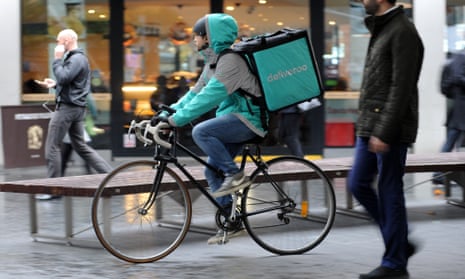Deliveroo riders have lost a high court battle to gain union recognition, in a blow to gig economy campaigners.
The ruling dismissed a judicial review brought by the Independent Workers Union of Great Britain (IWGB), which aimed to overturn an earlier ruling that confirmed those working for the delivery firm were self-employed.
In November last year the Central Arbitration Committee, which considers union recognition and collective bargaining cases, rejected an application by the IWGB to represent Deliveroo riders in north London.
The committee concluded that because riders were able to pass on a job to a substitute or abandon a job, they were not obliged to provide a “personal service” and therefore could not be classified as workers or employees with the right to collective bargaining.
In the judicial review of that ruling, the union claimed that not allowing collective bargaining breached the rights of Deliveroo riders under the European convention on human rights.
The union raised about £30,000 through the crowdfunding site CrowdJustice to back the legal campaign.
However, on Wednesday, the high court ruled that the riders’ human rights had not been breached and that the riders were not in an “employment relationship” in the context of European human rights law.
The IWGB general secretary, Jason Moyer-Lee, said the union would appeal against the high court ruling.
“Today’s judgment is a terrible one, not just in terms of what it means for low-paid Deliveroo riders but also in terms of understanding the European convention on human rights. Deliveroo riders should be entitled to basic worker rights as well as to the ability to be represented by trade unions to negotiate pay and terms and conditions,” he said.
Deliveroo welcomed the judgment, which it said was “a victory for riders who have consistently told us the flexibility to choose when and where they work, which comes with self-employment, is their number one reason for riding with Deliveroo”.
Dan Warne, the UK managing director of Deliveroo, said: “We will continue to seek to offer riders more security and make the case that government should end the trade-off in Britain between flexibility and security.”
